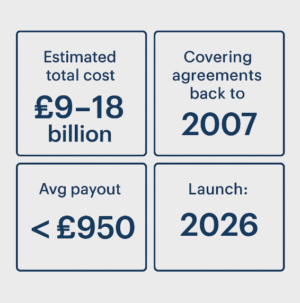PCP Motor Finance Claims – What the Supreme Court’s Ruling Means for Funders
On 1 August 2025, the UK Supreme Court finally handed down its decision in Johnson v FirstRand Bank, Hopcroft v Close Brothers, and Wrench v FirstRand Bank — three linked appeals testing different legal routes to challenge commission payments in Personal Contract Purchase (PCP) motor finance agreements.
While all three cases involved commissions paid by lenders to motor dealers acting as credit brokers, the arguments and outcomes were very different. The ruling narrows the scope for certain claims but confirms a viable path for others — creating clarity for litigation funders on where future capital should be deployed.
The Legal Routes Tested
| Case | Legal Argument | Supreme Court Finding | Outcome |
| Hopcroft v Close Brothers | Dealer owed a fiduciary duty → undisclosed commission = bribe | No fiduciary duty owed; bribery requires a fiduciary duty | Claim dismissed |
| Wrench v FirstRand Bank | Dealer owed a fiduciary duty → undisclosed commission = bribe | Same as Hopcroft | Claim dismissed |
| Johnson v FirstRand Bank | Unfair relationship under s.140A Consumer Credit Act (non-DCA, high commission, poor disclosure, tied lender arrangement) | Unfair relationship proven; lender ordered to repay commission + interest | Claim succeeded |
Key Takeways
- Bribery/fiduciary duty angle no longer works – Dealers are not fiduciaries, so undisclosed commissions cannot be treated as bribes.
- Unfair relationship route confirmed – High commissions, poor disclosure, and lender–dealer tie-ins can make agreements unfair under the Consumer Credit Act.
- Disclosure isn’t black and white – Adequacy depends on borrower sophistication, prominence of commission information, and whether commercial ties were revealed.
The FCA’s Redress Scheme – Scope and Scale
Just days after the ruling, the Financial Conduct Authority (FCA) announced it will consult (October 2025) on an industry-wide redress scheme covering:
- DCAs not properly disclosed – FCA believes all such cases could be unfair if disclosure fell short.
- High commission, poorly disclosed non-DCAs – Similar to Johnson, but the FCA will define the commission “cutoff” level.
Market impact:
- Estimated total cost: £9–18 billion — one of the largest consumer redress exercises since PPI.
- Scheme expected to launch in 2026, covering agreements back to 2007.
- FCA suggests most payouts will be under £950, though exceptional cases like Johnson will be higher.
- The threshold for “proper disclosure” is yet to be defined and will be critical to claim viability.

Funding Implications
The Supreme Court’s decision shifts the motor finance claims market from broad, mass marketing to evidence-led cases. For funders, it’s no longer just about volume — but about funding the right cases with the right partners.
- Focus capital on claims that mirror Johnson — high commission, poor or unclear disclosure, borrower vulnerability, and tied arrangements.
- Screen DCA cases for signs of inadequate disclosure — only these are likely to qualify under the FCA scheme.
- Regulator alignment — The FCA’s redress framework offers clearer timeframes, reduced uncertainty, and potential economies of scale.
At Fenchurch Legal, this is our strategy. We see PCP claims as a valuable component of a diversified litigation funding portfolio, not a standalone claim type.
Our strict underwriting criteria remain in place: we fund only those claims supported by strong legal precedent and credible evidence, and we work exclusively with law firms, claims management companies, and borrowers who meet our high operational and compliance standards.
With millions of PCP agreements written before the FCA’s 2021 DCA ban, the pipeline remains large. And with a regulator-led scheme now accelerating resolution, this sector offers a well-mapped, lower-risk opportunity with scalable processes and clearly defined risk parameters.
For investors seeking uncorrelated returns through litigation finance, PCP claims now represent a timely and well-structured opportunity within a diversified portfolio. The path is narrower — but clearer. And with clarity comes confidence.
To discuss investment opportunities in litigation funding or to explore funding options for PCP claims, please contact the Fenchurch Legal team.



